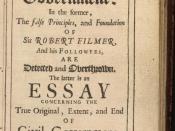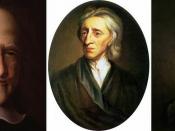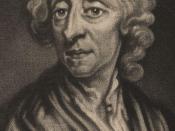As the general concepts of the Middle Ages showed their inability to explain the changes in the world that took place in the XVII and XVIII centuries, European philosophers faced the problem of creating the new models explaining the laws of nature and the structure of society. Compared to the medieval concepts, these models were more sophisticated and logically based - so they could be called scientific. The new era later named "the Age of Enlightenment" started. Its main idea was the superior value of reason. The feudal model of society was no longer capabale to provide wealth and progress and what's more important - the social justice. That's why the new ideas were to replace it. Among all European philosophers of the Age of Enlightenment the three ones are believed to have made the most significant contribution to the social contract theory - the basis of modern democratic society; they are Thomas Hobbes (1588-1679), John Locke (1632-1704) and Jean-Jacques Rousseau (1712-1778).
Thomas Hobbes (1588-1679), the English philosopher of the XVII century was actually the first to give a systematic, rational and scientific view on the social contract theory in his book "Leviathan or the Matter, Form and Power of Commonwealth Ecclesiastical and Civil". According to Hobbes the emergence of political society was preceded by the so called state of nature - the state of absolute, unrestricted freedom of human beings equal in their rights and abilities. People are also equal in their wish to possess the same rights. That's why the state of nature for Hobbes is the state of war which "is of every man, against every man". Human perfect freedom causes an intention to anarchy, chaos and constant struggle, it justifies men killing men. In such situation the restriction of each person's perfect freedom for the...



Great paper
Heres some extra info on Hobbes. Hobbes was on close terms with many of the best scientists and mathematicians
of the period, including most significantly Galileo, and their discoveries seemed to him to imply clearly that all things are made of material particles and that all change reduces to motion. Accordingly, the basic premise of Hobbes's
metaphysics is that all that exists is bodies in motion, motion being a continual relinquishing
of one place and acquiring of another. Because, according to Hobbes,
there are two main types of bodies, physical bodies and political bodies, there are two divisions of philosophy, natural and civil.
0 out of 0 people found this comment useful.